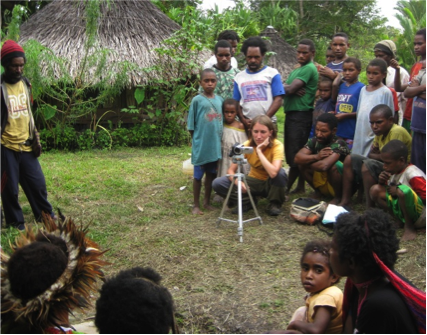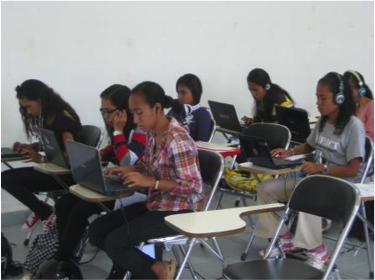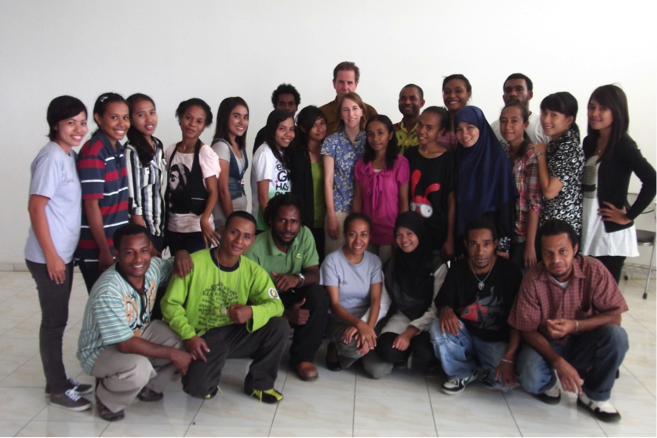The major aim of the Summits project, a cooperation between the Center of Endangered Languages Documentation (CELD http://www.celd-papua.net/the-celd.html ) in Manokwari and the Linguistics Department at the University of Cologne, is to improve on and extend the documentation of languages and cultures in the Indonesian part of Papua, with a special focus on a group of culturally and linguistically interlinked languages in the Central Highlands of this area. We strive to achieve this in three ways:
1. Finalizing the documentation of Eipo and Yale
The first component of the project consists of processing already collected data of the two Mek languages Eipo and Yale. Eipo and its neighbouring language Yale have been studied thoroughly by Volker Heeschen for several decades. The original audio recordings that were made during his field stays in the 1970s and 80s are being digitalized within the Summits project and made available via the Language Archive of the Max Plank Institute for Psycholinguistics in Nijmegen. Furthermore, the existing data is complemented by new recordings in order to cover a broader range of communicative events.
2. Documenting Yali
The second component of the Summits project consists of the documentation of Yali, a Dani language spoken by approximately 5000 people (Ethnologue 2009) in the highland area east of Angguruk. The data collected within this project will be from the district of Apahapsili, mainly recorded in the villages of Apahapsili, and Masahangguli, and their surrounding hamlets.  While a Bible translation has been published and some linguistic work by German missionaries who have been working in this area exists (e.g. Zöllner “Verbformen der Angguruk-Sprache”, unpublished manuscript), the major aim of the Summits project will be to compile a corpus of naturally spoken language, focusing especially on informal every day conversations and other spontaneous communicative events. In close cooperation with Siegfried Zöllner, we will furthermore digitize and archive old audio recordings from the time when the first missionaries entered the area in the 1960ies, so that this invaluable material will become accessible for the speech community and for further research. Just like in the Eipo-/Yale-component of this project, we thus aim to build upon existing works, systematically complementing older data with new material in order to gain a comprehensive documentation of the Yali language.
While a Bible translation has been published and some linguistic work by German missionaries who have been working in this area exists (e.g. Zöllner “Verbformen der Angguruk-Sprache”, unpublished manuscript), the major aim of the Summits project will be to compile a corpus of naturally spoken language, focusing especially on informal every day conversations and other spontaneous communicative events. In close cooperation with Siegfried Zöllner, we will furthermore digitize and archive old audio recordings from the time when the first missionaries entered the area in the 1960ies, so that this invaluable material will become accessible for the speech community and for further research. Just like in the Eipo-/Yale-component of this project, we thus aim to build upon existing works, systematically complementing older data with new material in order to gain a comprehensive documentation of the Yali language.
3. Students’ Projects: Documenting endangered languages in Papua
Thirdly, in cooperation with colleagues at UNIPA, an extensive capacity building program in descriptive and documentary linguistics is being organized for local students and staff members at the University of Manokwari, West Papua. Having attended this program, students are encouraged to carry out their own documentation projects, documenting their native languages.  During these closely supervised projects they will be funded by scholarships that will cover their expenses during their field stays as well as tuition fees and living costs during their last semester when they write their B.A. thesis. The collected data will be processed according to DoBeS standards and archived in the Language Archive. By offering local students the opportunity to deepen their knowledge in linguistics and field work methods, and by providing them with the technical equipment of modern language documentation, a contribution is made to building a sustainable basis for the documentation of endangered languages in Papua Barat and in Papua, the main mission of the CELD.
During these closely supervised projects they will be funded by scholarships that will cover their expenses during their field stays as well as tuition fees and living costs during their last semester when they write their B.A. thesis. The collected data will be processed according to DoBeS standards and archived in the Language Archive. By offering local students the opportunity to deepen their knowledge in linguistics and field work methods, and by providing them with the technical equipment of modern language documentation, a contribution is made to building a sustainable basis for the documentation of endangered languages in Papua Barat and in Papua, the main mission of the CELD.
Participants of the First workshop on Descriptive Linguistics and Language Documentation, January 2012



